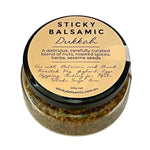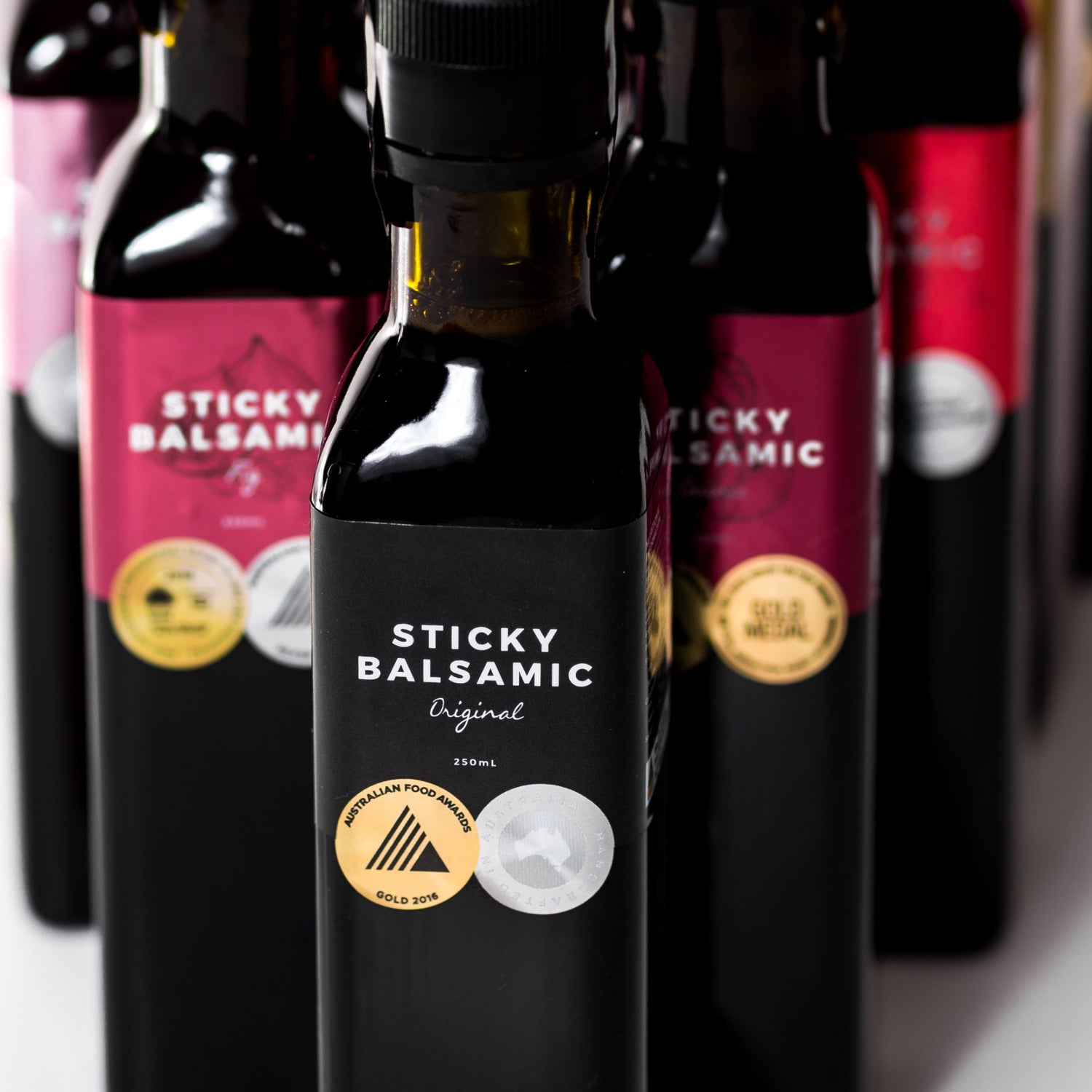Is Balsamic Vinegar Healthy? The Surprising Health Benefits You Need to Know
If you've ever wondered whether that delicious drizzle of balsamic vinegar on your salad is doing more than just making your taste buds happy, you're in for a treat! The short answer is yes—balsamic vinegar is surprisingly healthy and packed with benefits that go way beyond flavor.
Let's dive into why this dark, glossy condiment deserves a permanent spot in your kitchen (and your healthy eating routine).
What Makes Balsamic Vinegar Special?
Before we get into the health benefits, let's talk about what balsamic vinegar actually is. True balsamic vinegar comes from grape must (freshly pressed grape juice) that's aged for years, sometimes decades. This aging process concentrates the flavors and creates those complex, sweet-tart notes we all love.
But here's the kicker—this process also concentrates the beneficial compounds that make balsamic vinegar a health powerhouse.
The Antioxidant Advantage
Fighting Free Radicals One Drop at a Time
One of the biggest health benefits of balsamic vinegar comes from its impressive antioxidant content. These little warriors help protect your cells from damage caused by free radicals—those unstable molecules that can contribute to aging and various health issues.
The grapes used to make balsamic vinegar are naturally rich in polyphenols, particularly resveratrol (yes, the same compound that makes red wine famous for its health benefits). These antioxidants don't disappear during the aging process—they actually become more concentrated.
Research suggests that regular consumption of antioxidant-rich foods like balsamic vinegar may help reduce inflammation throughout your body, which is linked to everything from heart disease to arthritis.
Blood Sugar Benefits That Might Surprise You
A Natural Blood Sugar Helper
Here's something that might blow your mind: balsamic vinegar can actually help manage your blood sugar levels. Studies have shown that consuming vinegar with meals can help slow down the absorption of carbohydrates, leading to more stable blood sugar levels.
This is particularly beneficial if you're dealing with diabetes or prediabetes, but even healthy individuals can benefit from more stable energy levels throughout the day. The acetic acid in balsamic vinegar is the hero here—it helps improve insulin sensitivity and reduces the glycemic impact of your meals.
Try adding a tablespoon of balsamic vinegar to your salad before a carb-heavy meal. Your blood sugar will thank you!
Heart Health Hero
Supporting Your Cardiovascular System
Your heart loves balsamic vinegar almost as much as your taste buds do. The antioxidants we mentioned earlier play a crucial role in supporting cardiovascular health by helping to reduce oxidative stress and inflammation in your blood vessels.
Some studies suggest that the polyphenols in balsamic vinegar may help improve cholesterol levels by reducing LDL (the "bad" cholesterol) while potentially increasing HDL (the "good" cholesterol). The potassium content in balsamic vinegar also supports healthy blood pressure levels.
Plus, if using balsamic vinegar helps you eat more vegetables (because let's face it, everything tastes better with a good balsamic drizzle), you're getting additional heart-healthy benefits from increased vegetable consumption.
Weight Management Support
A Friend for Your Waistline
If you're trying to maintain or lose weight, balsamic vinegar can be a valuable ally. First off, it's incredibly low in calories—just about 5 calories per tablespoon—but it packs a serious flavor punch that can make healthy foods more satisfying.
The acetic acid in balsamic vinegar may also help with weight management by promoting feelings of fullness and potentially boosting metabolism slightly. Some research suggests that vinegar consumption can help reduce belly fat accumulation, though more studies are needed to confirm these effects.
Most importantly, using balsamic vinegar as a salad dressing or marinade means you're likely consuming fewer calories than you would with creamy, high-fat alternatives.
Digestive Health Benefits
Supporting Your Gut
Your digestive system appreciates balsamic vinegar too. The probiotics that develop during the fermentation and aging process can contribute to a healthy gut microbiome, though the amounts are relatively small compared to dedicated probiotic foods.
The acetic acid in balsamic vinegar may also help improve nutrient absorption, particularly minerals like calcium and iron. This means you're not just adding flavor to your meals—you're potentially helping your body make better use of the nutrients in your food.
Bone Health Support
Strengthening from Within
Here's a benefit you might not expect: balsamic vinegar may support bone health. The acetic acid can help improve calcium absorption, which is crucial for maintaining strong bones. Additionally, some of the compounds in aged balsamic vinegar have been studied for their potential anti-inflammatory effects on bone tissue.
While balsamic vinegar shouldn't be your only strategy for bone health, it can be a tasty part of a bone-supporting diet that includes calcium-rich foods and regular exercise.
How to Maximize the Health Benefits
Making the Most of Your Balsamic
To get the most health benefits from balsamic vinegar, quality matters.
Here are some easy ways to incorporate more balsamic vinegar into your healthy eating routine:
- Use it as a salad dressing base (mix with olive oil and herbs)
- Drizzle over roasted vegetables
- Add to marinades for lean proteins
- Use as a finishing touch on fresh fruit
- Create healthy vinaigrettes for grain bowls
The Bottom Line
So, is balsamic vinegar healthy? Absolutely! This flavorful condiment offers impressive antioxidant content, blood sugar benefits, heart health support, and much more. While it's not a miracle cure, it's definitely a delicious way to add some extra health benefits to your meals.
The best part? You don't need much to reap the benefits. A tablespoon or two per day is plenty to enjoy both the flavor and health advantages that balsamic vinegar has to offer.
Next time you're drizzling that rich, dark goodness over your salad, you can feel good knowing you're doing something wonderful for both your taste buds and your health!
References:
-
Johnston, C. S., Kim, C. M., & Buller, A. J. (2004). Vinegar improves insulin sensitivity to a high-carbohydrate meal in subjects with insulin resistance or type 2 diabetes. Diabetes Care, 27(1), 281-282.
-
Kondo, T., Kishi, M., Fushimi, T., Ugajin, S., & Kaga, T. (2009). Vinegar intake reduces body weight, body fat mass, and serum triglyceride levels in obese Japanese subjects. Bioscience, Biotechnology, and Biochemistry, 73(8), 1837-1843.
-
Budak, N. H., Aykin, E., Seydim, A. C., Greene, A. K., & Guzel‐Seydim, Z. B. (2014). Functional properties of vinegar. Journal of Food Science, 79(5), R757-R764.
-
Ostman, E., Granfeldt, Y., Persson, L., & Björck, I. (2005). Vinegar supplementation lowers glucose and insulin responses and increases satiety after a bread meal in healthy subjects. European Journal of Clinical Nutrition, 59(9), 983-988.
-
Petsiou, E. I., Mitrou, P. I., Raptis, S. A., & Dimitriadis, G. D. (2014). Effect and mechanisms of action of vinegar on glucose metabolism, lipid profile, and body weight. Nutrition Reviews, 72(10), 651-661.
-
Halima, B. H., Sonia, G., Sarra, K., Houda, B. J., Fethi, B. S., & Abdallah, A. (2018). Polyphenols in Mediterranean plant foods: structure, diversity, and potential health benefits. Oxidative Medicine and Cellular Longevity, 2018.
-
Verzelloni, E., Tagliazucchi, D., & Conte, A. (2007). Relationship between the antioxidant properties and the phenolic and flavonoid content in traditional balsamic vinegar. Food Chemistry, 105(2), 564-571.
-
Natera, R., Castro, R., de Valme García-Moreno, M., Hernández, M. J., & García-Barroso, C. (2003). Chemometric studies of vinegars from different raw materials and processes of production. Journal of Agricultural and Food Chemistry, 51(11), 3345-3351.
-
White, A. M., & Johnston, C. S. (2007). Vinegar ingestion at bedtime moderates waking glucose concentrations in adults with well-controlled type 2 diabetes. Diabetes Care, 30(11), 2814-2815.
-
Brighenti, F., Castellani, G., Benini, L., Casiraghi, M. C., Leopardi, E., Crovetti, R., & Testolin, G. (1995). Effect of neutralized and native vinegar on blood glucose and acetate responses to a mixed meal in healthy subjects. European Journal of Clinical Nutrition, 49(4), 242-247.
Note: this is not intended to be medical advice. Please speak with your health advisor for specific information for you.









